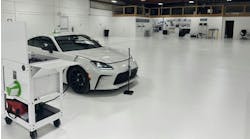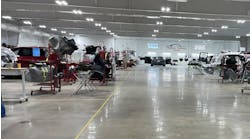Reliance on Chinese products bodes trouble for U.S. manufacturers
Remember when anything that came from Japan was regarded as junk? It didn't matter what it was – if it was from Japan it was junk, including its cars that you could almost hear rust on a humid day.
Well, we know what happened there, don't we? The Japanese now make some of the most reliable, most technologically advanced vehicles in the world. It took the Japanese carmakers less than 25 years to achieve this, while the South Korean upstarts have taken half that time to produce world-class vehicles.
Next in line is China. It already has captured the American market with its low-cost products. Apparently, the lure of low prices is worth just about any risk. Pets can be replaced, can't they?
Recently I saw a lapel pin that said "Buy American" on the front, while on the back it said "Made in China." The irony is gut wrenching as the trade imbalance between the United States and China widens further.
With our reliance on Chinese products – those made by Chinese manufacturers, as well as those made in China for American companies – we are losing our manufacturing leadership in the world. It should come as no surprise that China is now poised to do what the Japanese and South Koreans have done in the American car market. Consider two undeniable points. First, China has the inclination and the means to flood the American market. Second, the American public is already conditioned to accept what China will build and sell. If you have any doubts about that, consider a recent study conducted by research firm Auto Pacific that found more than 10 percent of Americans would consider a vehicle manufactured in China or India – without knowing the specific brands or vehicles. It's a world economy as defined by Wal-Mart.
One concern I have is that the Chinese will enter the American auto with a penchant to just meet minimum standards. If you think the metal was thin when the Japanese made their push into this market, the Chinese will give wafer-thin a whole new meaning. And then there's the engineering aspect. When building small, cheap cars – and that's what they will send to America – they will cut corners to save a Yuan here and there. This, unfortunately, will mean less repair work for you because these small, cheap cars that are damaged will be quickly totaled. For those that can be repaired, you will suffer fits trying to work with thinly gauged sheet metal that is more appropriate for food storage.
And then there's another concern that's even more distasteful. I'm referring to us turning over another major portion of our economy to the Chinese. If they get a foothold into the American auto market and sell millions of vehicles here, Americans will suffer further job losses, which will inevitably lead to a further decline in our standard of living. (Note: We're just a bunch of chumps for letting this happen.)
If this smacks of protectionism, so be it. I'd rather think of it as "fair" trade vs. "free" trade. Just look at the most telling facts: we import 4.5 times the amount of Chinese goods compared to what we export to China. In dollars, that's a $260 billion trade deficit.
And then there's that gnawing matter of being indebted to China. According to the Washington Post, China holds almost $1 trillion in U.S. bonds. In essence, we are beholding to China. The threat that it might sell off these bonds holds our economy in check. We're not able to do anything about how they manipulate their currency, which enables them to price their products more cheaply.
We can't sell the Chinese the volume they sell us and we owe them money. That's a lose-lose proposition that we should change. If we don't, we better brush up on our Mandarin.



